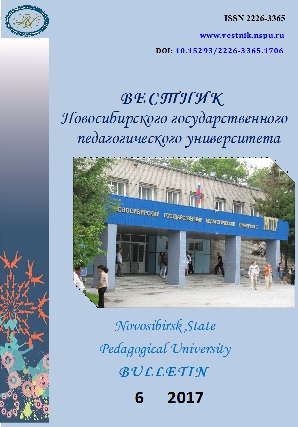К пониманию педагогической рефлексии учителя: обоснование гуманитарной модели
To understand pedagogical reflection of teachers: Justification of human model
Author(s): Margarita Nikolaevna KozhevnikovaSubject(s): School education, Higher Education
Published by: Новосибирский государственный педагогический университет
Keywords: Humanitarian reflection; Philosophy of education; Teacher's authenticity; Inexpressible practical knowledge; Hermeneutic practice
Summary/Abstract: Introduction. The article is devoted to the problem of understanding, use, and teaching pedagogical reflection. The purpose of the article is to provide philosophical grounding of pedagogical reflection and to develop its mythological humanitarian model. Materials and Methods. The research was carried out within the framework of philosophy of education methodology, using epistemological analysis, phenomenological approaches and socio-philosophical criticism. When developing a humanitarian model of reflection, the methodology of participant observation was applied. Results. The author analyzed the existing interpretations and practices of pedagogical reflection, including the foreign theories of D.Shon, Zeichner, Liston, etc., the reflective teaching movement and the "research-in-action" movement, and Russian theory and practice of Methodological school, a psychological concept and methodology of Bizayeva, a reflexive-oriented model of teacher education of Stetsenko, etc. Distinguishing the types of reflection, the author singled out humanitarian reflection. Philosophical analysis of the nature of reflection led to the problem of professional teacher’ self-consciousness. The meaning of humanitarian reflection as a way to "the authenticity of the teacher" revealed the need for the teacher's reflective position.As it was understood from different educational works, 'reflexion' could be interpreted as events different by their nature. Different types of pedagogical reflection were identified, from which the humanitarian one was singled out and justified. It could be utilized in different scales of use, with different levels of theoretical conceptualization and with different outcomes. A special methodology was worked out to master humanitarian reflection in the continuing teacher education (continuing professional development) according to the author's model ‘Creative Autonomous Reflexive Teacher’, in the professional learning community.It was acknowledged that the epistemology of pedagogical reflection revealed the problem of relations between the reflection and action. Conclusions. As it was clarified, the humanitarian reflection which is different from the organizational and logical-methodological (or technical) ones, is the important path to the "authenticity of the teacher", which justifies the need for a reflective position of a teacher. Due to its capacities of 'condensation' and 'crystallization' of 'personal human meanings' in one’s being a teacher, in the nearest future in the face of challenges of artificial intelligence coming into education the relevance of this type of reflection can only increase.
Journal: Вестник Новосибирского государственного педагогического университета
- Issue Year: 7/2017
- Issue No: 6
- Page Range: 134-151
- Page Count: 18
- Language: Russian

